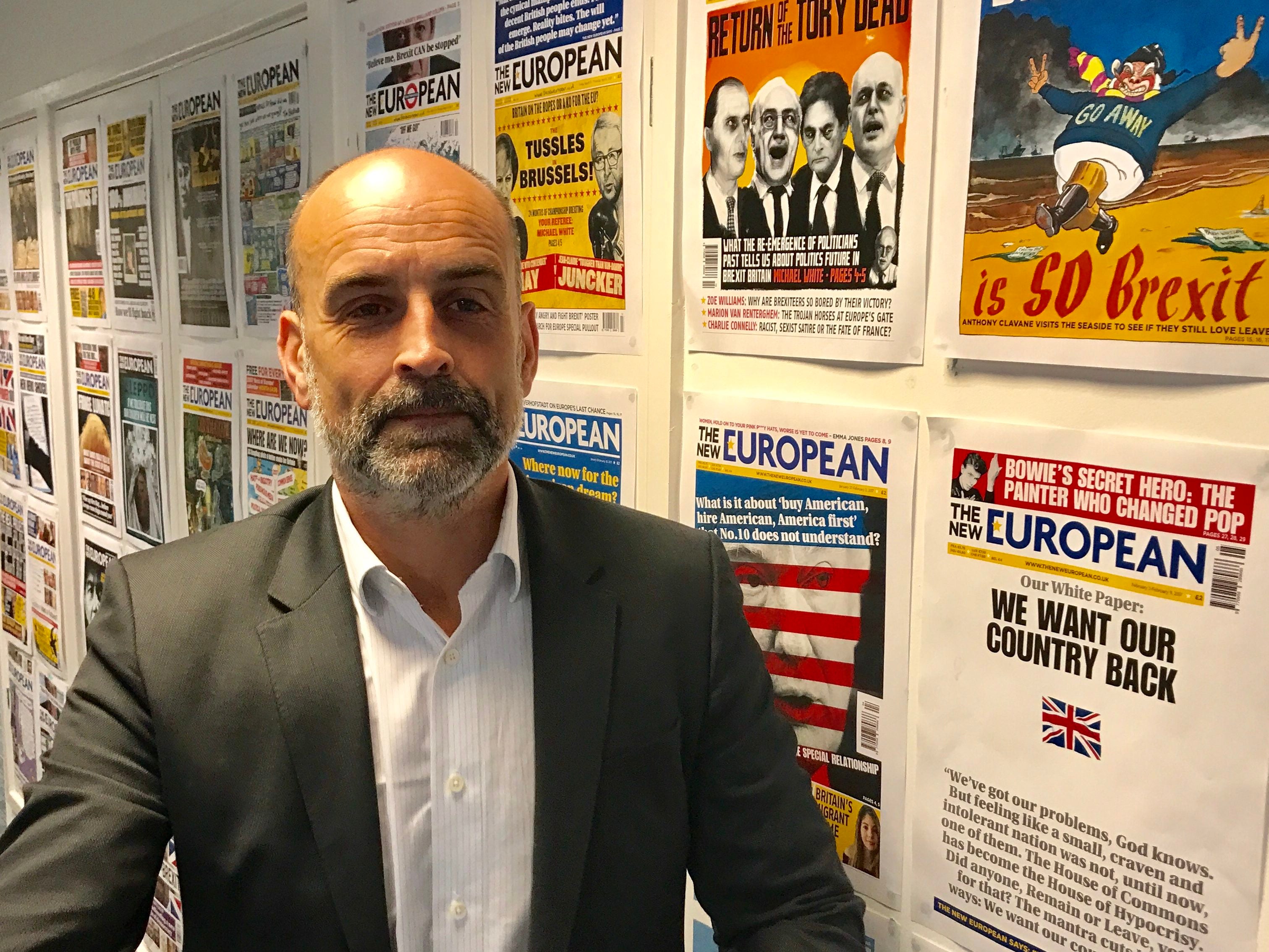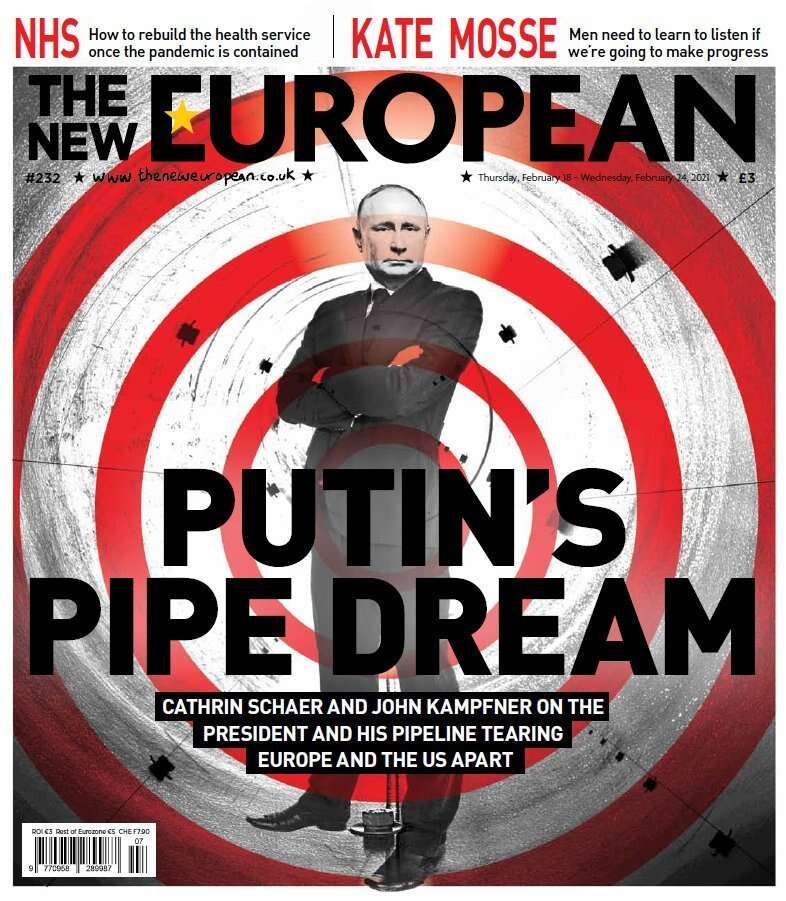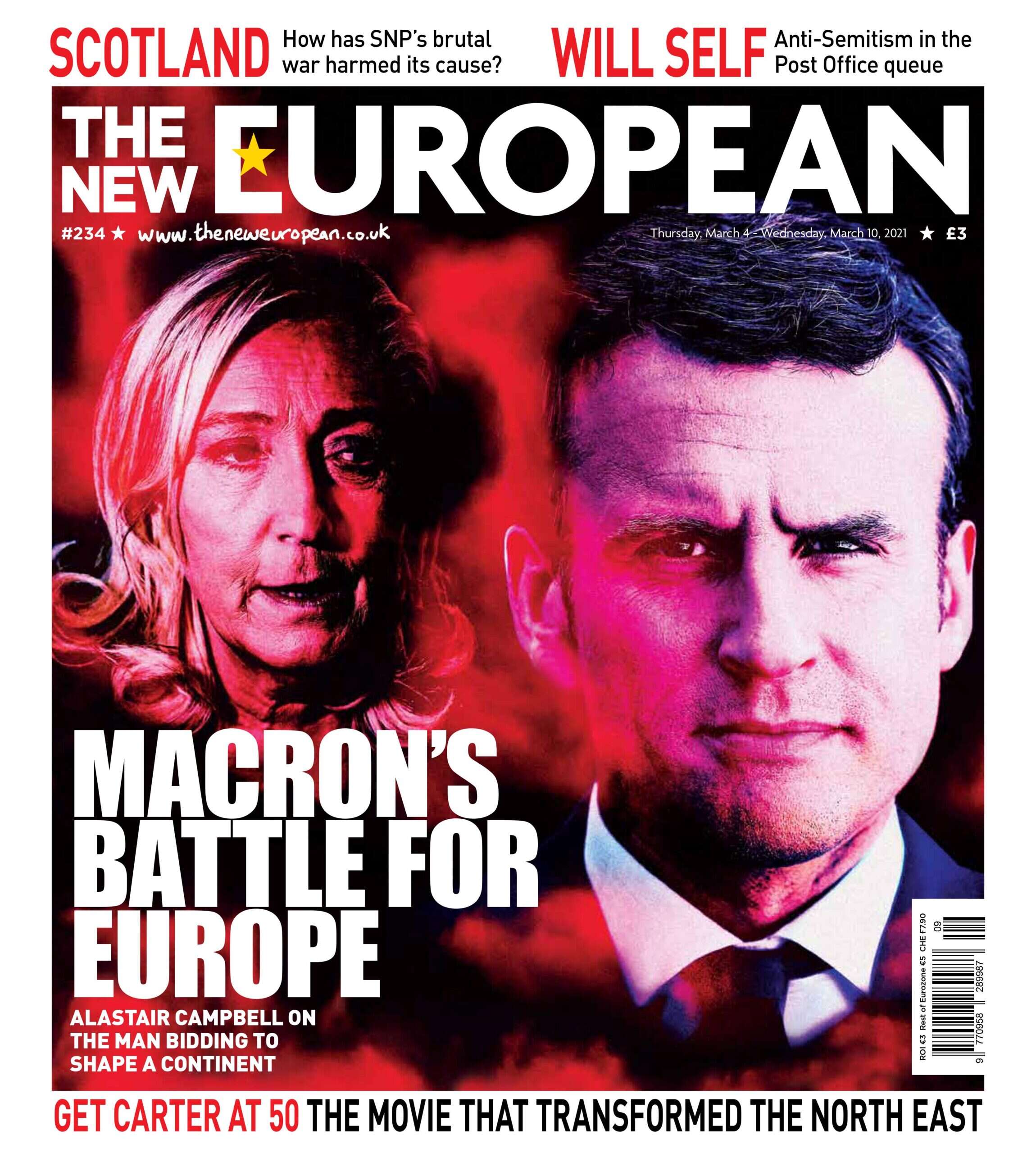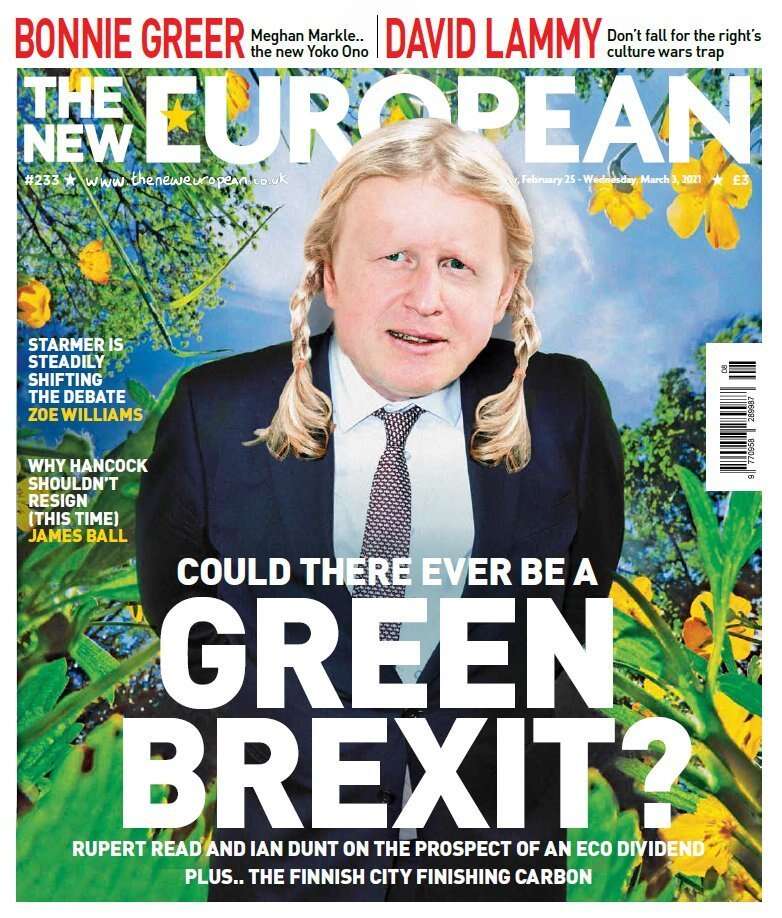
“The riches are in the niches.” Admittedly it only rhymes in an American accent, but it’s a philosophy that is powering The New European owner Matt Kelly who has bought the title from local publisher Archant, where he launched it as a “pop-up paper” two weeks after the 2016 Brexit vote stunned Britain.
Kelly isn’t going it alone exactly. He has accrued a consortium of investors, forming a fantasy team of media titans. Among them are former FT editor Lionel Barber, ex-BBC director and former NY Times chief exec Mark Thompson and Edelman’s chief exec for Europe Ed Williams.
Kelly is understood to have paid less than half-a-million pounds for The New European, which turns over £1.5m a year and breaks even. The deal was completed in six weeks, with Kelly also leaving his role as chief content officer at Archant (now owned by a private equity firm) in February.
[Read more: The New European bought by founder and Archant content boss Matt Kelly]
“I felt that The New European had never come close to fulfilling its potential at Archant,” Kelly told Press Gazette. “Everything was done on an absolute shoestring”, he added. “Having conceived it, I would have hated to have left Archant and seen it just wither away.”
Kelly has since set up The New European Ltd with partner Gavin O’Reilly, the former Independent News and Media chief exec who will serve as TNE’s executive chairman, and raised £1m from 18 investors. He estimated that with the “high calibre” names on board, the publication’s value is already “significantly more than it was the day we bought it”.
“We’re going to really give it a go, try to make it a real force in political periodicals in the UK,” Kelly said, setting out his vision for the title, which now prints weekly (previously fortnightly) and also publishes online. “With some significant investment, which we’re currently making, I expect it to become a good strong profitable business within a couple of years.”
There are just five staff at present: Kelly, O’Reilly and three full-time journalists, including editor Jasper Copping. The number of journalists is set to grow over the coming months, but Kelly is keen not to swell its ranks too much, suggesting ten staff would be “about right”.
“One of the things that The New European proves is that you do not need 20 or 30 people to run a good periodical,” he said. “You don’t have to have all these endless ‘deputy political editor’ and ‘deputy European editor’ [roles] and a cast of thousands.
“You need your core experts who really care about it – and those people should feel really involved in the paper and, preferably, own a piece of the business – and the rest of it is about paying good money for the best talent available [to write for you] – and there’s plenty of great talent out there.”
Even when lockdown restrictions ease, Kelly said the team will continue to work remotely and won’t have any offices.
As chief executive, editor-in-chief and shareholder, Kelly’s main focus is on driving subscriptions and less so growing advertising revenue, which he said had “always been a problem for” the title. “This traditional model of 50% reader revenue 50% advertising – that’s not for me… I’d much rather have a set of products that people felt completely resonated with what they think and excited them editorially – and people will pay willingly for that.”
The New European has 10,000 subscribers – 8,500 in print and the rest digital – who pay from £8 a month. On top of this, it sells some 7,000 newsstand copies, no bulks, which has fallen from about 9,000 as a result of the pandemic, while subs are up 20%.
Kelly hopes to bounce back to the 20,000 total sales the title was making pre-pandemic once lockdown restrictions ease, but he has a bigger target in mind for the near term. “I’d like to think that within two or three years, if we get things right, we’ll double subs to 20,000 in the UK,” he said.
“If we could be selling 5,000 retail and have closer to 20,000 subs in the UK within three years, then it’s a great business.” Although he wants to concentrate on the UK for now, Kelly said there was a market for growing digital subscriptions in Europe in what would seem like an easy win.
But first, the title’s digital platforms, built by Archant, will receive investment to bring them in line with the newspaper. “Right now, I don’t believe we’re offering a good enough service to say to people you should be paying for these digital platforms,” said Kelly. “We’re investing quite a lot of money in making sure that the digital side of things is every bit as interesting and absorbing as the newspaper side is.”
‘The truth is we’re probably a magazine disguised as a newspaper’
Print has been at the heart of The New European’s offering, using its often striking magazine-style front pages to stand out on the newsstand, where it sits with the newspapers rather than weekly magazines like The New Statesman and The Spectator. This however won’t change.
“The magazine racks are so crowded and so fiercely competitive, but if you look down at your feet where all the daily and the weekly newspapers are you get much more footfall and you stand out more. And with our covers, I think that’s where we have the greatest chance of making an impact is, as a newspaper,” said Kelly.
“The truth is we’re probably a magazine disguised as a newspaper.”
Kelly described reading newspapers as a “slightly esoteric passion these days”, a view supported by declining print sales across the news industry, but said he believed that when it comes to content, “the fact that everything starts from a newspaper makes it of a good quality”.
He said he plans to install a hard paywall online for The New European, in line with his view that “people should pay for good content”, something Kelly, a former night editor of the Daily Mirror, said the news industry had previously failed to recognise.
“The newspaper industry over my career has persistently underestimated the power of what it does when it gets stuff right, and has been very shy about demanding that people pay for what we do,” he said. “I can remember newspapers sticking DVDs on the front pages of newspapers, that’s how crap we thought our products were – that we had to get people to buy a DVD before they pick us up.
“I think the reverse is true, I think if your content’s good enough, not only can people be expected to pay for it but I think people will actively want to pay for it because they will see it as being part of a community and they’ll want that community to thrive.
“There’s this wonderful American phrase right now: the riches are in the niches. I think it’s very true. If you’ve got a niche, and you’re completely focused on delivering value and content to that niche, then not only will they pay for it, they will willingly pay for it. I see the evidence for that around The Guardian’s success [with] reader donations.”
At a glance…
| Publication | The New European |
| Publisher | The New European Ltd |
| Newsstand sales | c. 7,000* |
| Owner | Matt Kelly |
| Editor | Jasper Copping |
| Subscriptions | c. 10,000* |
| Total website monthly visits | 1m (Similarweb, Feb 2021) |
| Turnover | £1.5m* |
| Profit/loss | Breaks even* |
* own figures
‘The paper for 48%, that was then…’
The real question for Kelly is whether there is still an audience for The New European in Brexit Britain. Four years of uncertainty over whether the country would ever actually leave the EU were finally brought to an end on 31 January last year as Boris Johnson took the country out.
The title was launched as the paper “for the 48%” of Remain voters when hot blood still ran through the veins of one half of the country, then reeling from defeat. As the heat of the Brexit vote cools and the referendum recedes further into history, who now is its target audience?
Kelly said the EU Referendum had shown “what nonsense” the old political labels of Labour and Tory were in today’s Britain, with Brexit crossing traditional party lines, and said his paper is “about people not parties”.
But he said there remained “a lot of people in the UK who feel emotionally very attached to the idea of Europeanism, they define themselves as Europeans” and for whom the idea of Europe is “very precious”.
“I want The New European to be a platform for ideas for progress for Britain and for Europe and for everybody. I don’t want it to be a metropolitan elite. I don’t want it to be seen as something up in the clouds discussing highfalutin ideas. I want it to be able to demonstrate that Britain can be still part of a very progressive European project, even if it’s not within the EU.”
He added: “We’re going to always try to be pragmatic and realistic, but true to the very same values that made everybody so bloody angry on June 24th 2016. That is still very much alive, that’s not gone away. But the paper for 48%, that was then; now we are the paper for a constructive platform for ideas for progress in Europe.”
‘For hardcore Remainers, now the job is to not be seen as a whining rump of lunatics who will never let go…’
Kelly criticised the mainstream UK media’s failure to cover stories of interest in Europe and reflect pan-European art and culture: “There’s a tonne of great stuff going on just on our doorstep, which goes unreported.”
“My main theme for The New European is that everything in it should be different. I’m not interested in adding to the commentary on this week’s Westminster news. I’m much more interested in taking a slightly different perspective, maybe a longer perspective. But if you can imagine what the London Review of Books does for book reviews, I’d like The New European to do for European politics and culture.”
Kelly said he still believes there are “big chunks of Brexit that don’t make any sense” and that at some point there will be a “calling to account of people who sold us on the supposedly blissful future Brexit promised”. But, he is forced to concede that “it has happened”.
“Rejoining [the EU] may be something that happens in a decade or two, but it’s not going to happen in the next two or three years,” he said. “And in the meantime, I think people have got to stop staring back and screaming about the iniquity of the vote and start looking forward and thinking about how can we address some of the issues that led to that vote in the first place.
“[For] hardcore Remainers, now the job is to not be seen as a whining rump of lunatics who will never let go – I don’t think many are, but there are a few and I don’t want The New European to be that. I want The New European to be much more optimistic and much more forward looking.”
He said TNE was not slavish to the EU and has picked it up on its failings, not least the handling of the Covid-19 vaccine rollout which has seen the union struggle to get jabs in arms and threaten to block exports of the vital drugs – something Kelly described as an “obvious balls up”.
“I’ve always said that the European Union needs to change, an awful lot,” he said. “I think there are many legitimate criticisms of the way the European Union is run. I think if the European Union wants Britain back, it’s got a long road to travel as well.
“But I do believe that when it comes to the basics, the advantages are so overwhelming in the world we live in, of being part of this huge block of trading and the personal freedoms it gives you of movement and work and travel. Those things are so advantageous, I think, that our kids will want to reconsider the decision that their parents and grandparents made.”
If Kelly’s right, The New European’s audience could continue to grow as a new generation of pro-European readers come of voting age. And where there are readers that identify with a brand, there are riches to be made.
https://www.pressgazette.co.uk/editor-of-the-new-european-on-a-year-in-print-if-we-are-a-stone-in-the-shoe-of-paul-dacre-thats-a-worthwhile-position-for-me/
Email pged@pressgazette.co.uk to point out mistakes, provide story tips or send in a letter for publication on our "Letters Page" blog



